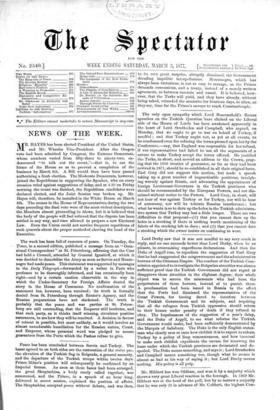The week has been full of rumours of peace. On
Tuesday, the Times, in a second edition, published a message from an "Occa- sional Correspondent" at St. Petersburg, affirming that the Czar had held a Council, attended by General Ignatieff, at which it was decided to demobilise the Army as soon as Servia and Monte- negro had made peace. This statement was supported by messages in the Daily Telegraph—forwarded by a writer in Paris who -professes to be thoroughly informed, and has occasionally been right—and by a certain caution observable in the way in which the Under-Secretary for Foreign Affairs denied the -story in the House of Commons. No confirmation of the statement has, however, been received ; its truth is formally denied from St. Petersburg through Reuter's Agency, and the Russian preparations have not slackened. The truth is probably that the peace and war parties at St. Peters- burg are still contending, that the Emperor still hesitates, and that each party, as it thinks itself winning, circulates positive assurances, to see how they will be received. A decision in favour of retreat is possible, but most unlikely, as it would involve an almost unendurable humiliation for the Russian nation, Court, and Emperor, whose personal word was pledged to secure guarantees from the Porte which the Pashas refuse to give.


































